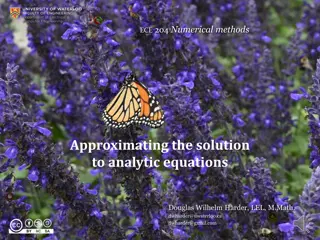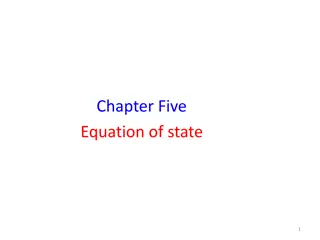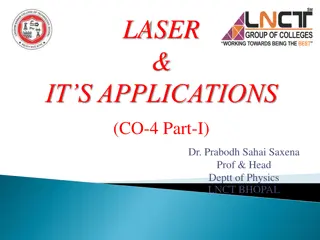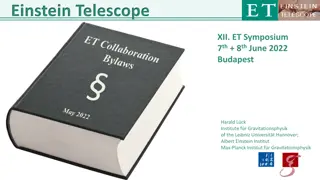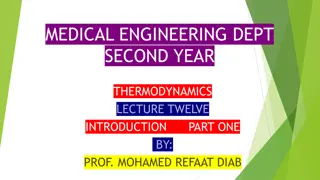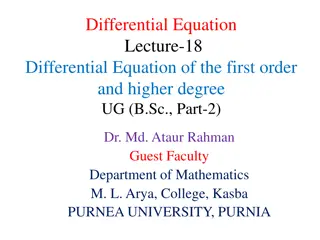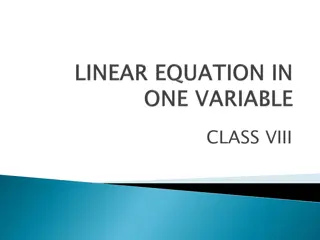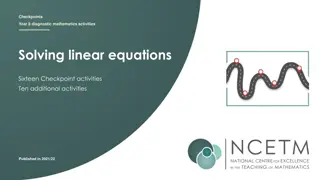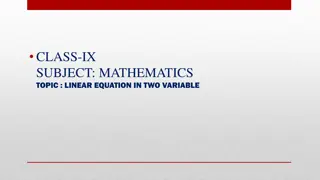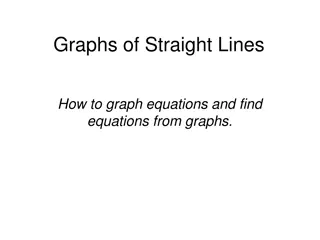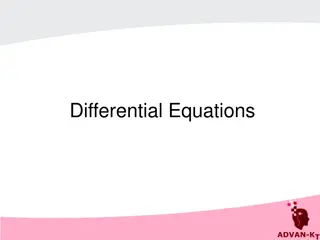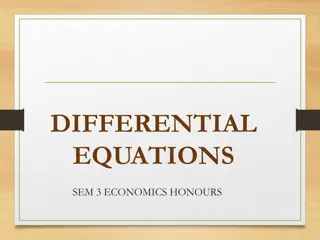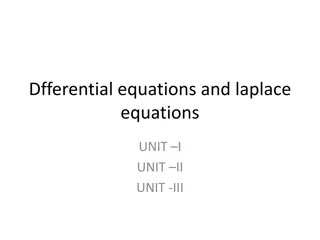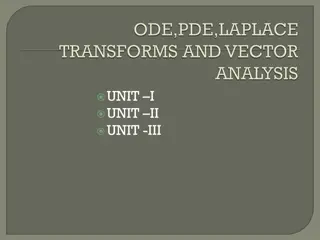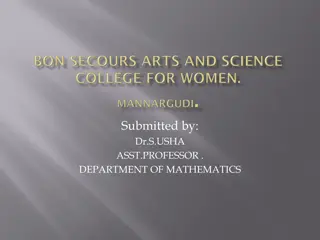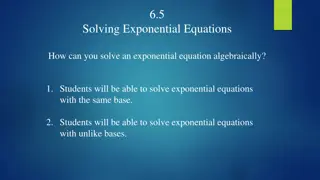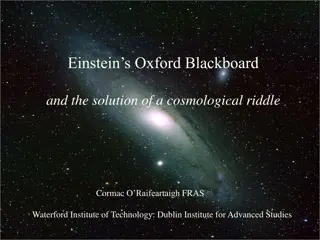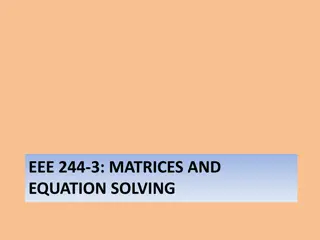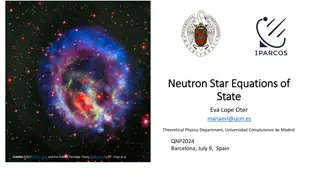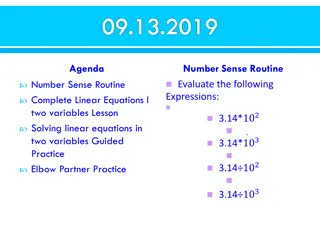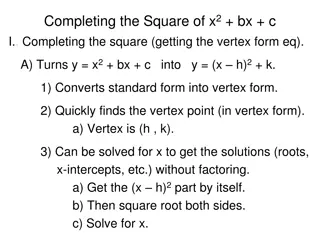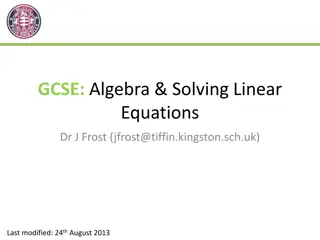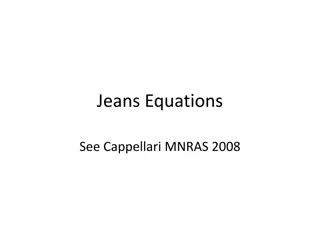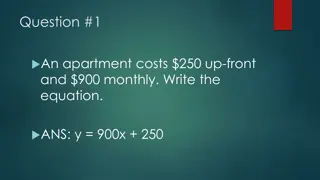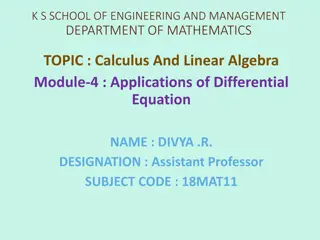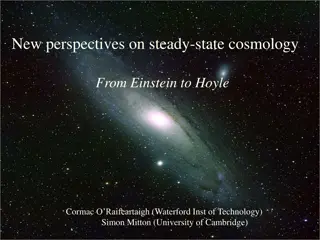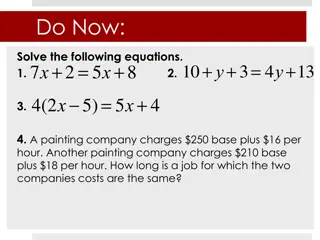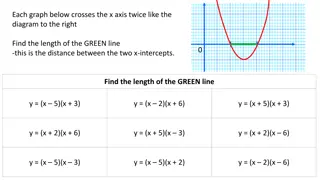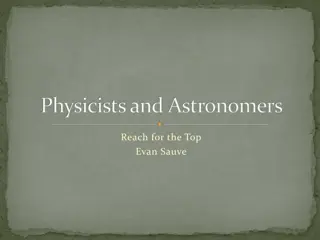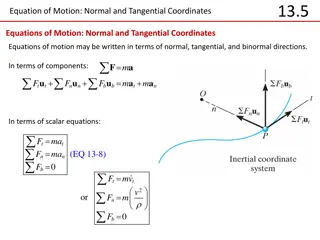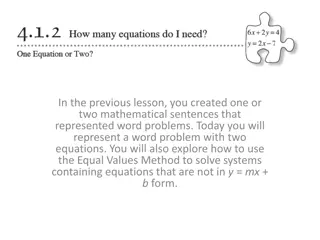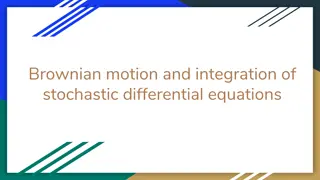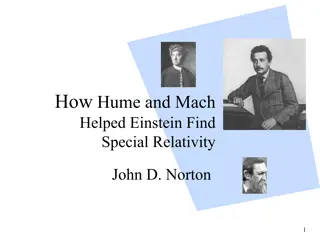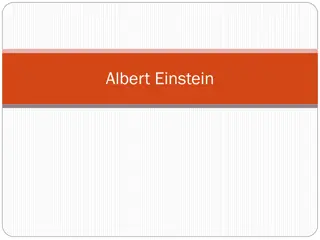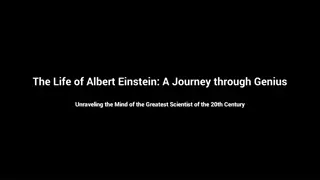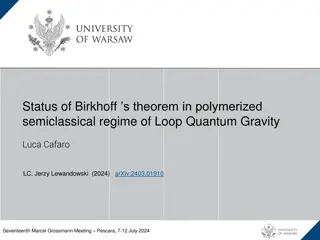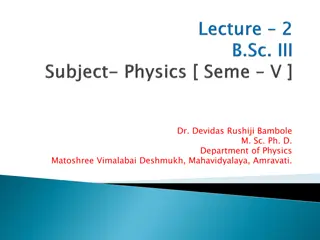Understanding Chemical Reactions: Reactants, Products, and Balancing Equations
Chemical reactions involve reactants that transform into products. Balancing equations is essential to ensure the conservation of mass. Learn about decomposition reactions, chemical equations, and methods to balance equations effectively.
4 views • 39 slides
Understanding Numerical Methods for Approximating Analytic Equations
Introduction to approximating solutions to analytic equations, focusing on differential equations, integral equations, and integro-differential equations. Exploring ordinary and partial derivatives, differential and integral equations, and the involvement of unknown functions and their derivatives a
2 views • 15 slides
Equations of State in Thermodynamics
In the study of thermodynamics, equations of state play a crucial role in predicting the behavior of substances based on pressure, volume, and temperature relationships. These equations define the interdependence of various intensive properties for a simple compressible substance. The development an
0 views • 42 slides
Understanding Laser Technology: Principles, Applications, and Einstein's Coefficients
Exploring the fascinating world of lasers, this content delves into the principles governing laser technology, including the concept of stimulated emission by Einstein. It covers the characteristics of lasers, different types, and the significant contributions of pioneers in the field. The explanati
0 views • 14 slides
Einstein Telescope Collaboration Bylaws and Code of Conduct
The Einstein Telescope Collaboration has established internal rules and a Code of Conduct to ensure a professional, respectful, and inclusive environment free from discrimination and harassment. All members are expected to adhere to these guidelines to foster a supportive atmosphere for scientific d
1 views • 32 slides
A Truly Beautiful Mind - The Life of Albert Einstein
The biographical feature "A Truly Beautiful Mind" delves into the remarkable life and achievements of the renowned scientist Albert Einstein. It highlights his early struggles and societal misconceptions, showcasing how his intellectual brilliance and humanitarian ideals shaped the world of science
0 views • 18 slides
Understanding Maxwell Equations in Thermodynamics
In thermodynamics, Maxwell equations are derived using Euler's reciprocity relation. They involve characteristic functions such as internal energy, free energy, enthalpy, and Gibbs free energy, along with parameters like temperature, entropy, pressure, and volume. These equations form the foundation
0 views • 15 slides
Differential Equations of First Order & Higher Degree: Lecture 18
This lecture covers differential equations of first order but not of the first degree, general forms of such equations, methods for solving them, and examples of differential equations to be solved. The content includes detailed explanations, equations, solutions, and problem-solving techniques.
0 views • 9 slides
Understanding Linear Equations in Algebra: A Comprehensive Overview
An exploration of algebraic expressions, equations, and linear equations in one variable with detailed explanations and examples. Discover the fundamental concepts, solving methods, and applications of linear equations in various word problems. Master the art of transforming mathematical expressions
0 views • 15 slides
Linear Equations Checkpoint Activities for Year 8 Students
This diagnostic mathematics resource for Year 8 students focuses on solving linear equations through a series of Checkpoint and additional activities. Published in 2021/22, the content covers topics such as representing equations with algebra and solving for unknown variables. Students will engage w
0 views • 47 slides
Learning Linear Equations in Two Variables
Understanding linear equations in two variables is essential for solving real-life problems. This topic covers the definition, solution, and graphical representation of such equations, helping students connect mathematical concepts to practical scenarios. By learning to write and solve linear equati
3 views • 31 slides
Understanding Graphs of Straight Lines and Equations
Learn how to graph equations and find equations from graphs of straight lines. Explore tables of values, plotting points on a coordinate plane, drawing lines through points, and identifying relationships between graphs and algebraic expressions. Discover the gradient-intercept form of a straight lin
0 views • 14 slides
Understanding Differential Equations: Types, Classification, and Solutions
Differential equations are mathematical equations that relate independent and dependent variables through differential coefficients. They can be classified as ordinary or partial, based on the types of derivatives involved. The order and degree of a differential equation, as well as its linearity an
3 views • 26 slides
Understanding Differential Equations in Economics Honours
Differential equations, introduced by Newton and Leibniz in the 17th century, play a key role in economics. These equations involve derivatives and represent implicit functional relationships between variables and their differentials, often related to time functions. The order and degree of a differ
1 views • 16 slides
Introduction to Differential Equations and Laplace Equations
Understanding differential equations of various orders, solving methods, linear and non-linear equations, ordinary and partial differential equations, definitions of solutions, and general vs. particular solutions in the context of Differential Equations and Laplace Equations.
1 views • 20 slides
Understanding Differential Equations: Basics to Applications
Differential equations are fundamental in mathematics, with various types such as first-order, partial, and Clairaut's equations explored in this content. The content covers general equations, solutions, and examples, providing insights into linear and higher-order equations with constant coefficien
0 views • 20 slides
Understanding Partial Differential Equations of Second Order
Exploring the concepts of second-order partial differential equations in mathematics, including the general form, linear equations with variable coefficients, and equations with constant coefficients. Learn about integral solutions, examples, and techniques for solving these equations with detailed
0 views • 21 slides
Solving Exponential Equations Algebraically
Learn how to solve exponential equations algebraically with the same base and unlike bases. Understand the properties of equality for exponential equations and practice solving various equations step by step. Improve your skills in rewriting equations with the same base and applying the rules of exp
0 views • 9 slides
Einstein's Oxford Blackboard: Unraveling the Cosmos in 1931
Einstein's lectures in Oxford in 1931, focusing on his blackboard model of the cosmos, shed light on anomalies in his previous work and marked a pivotal moment in 20th-century science. This glimpse into Einstein's views of Oxford and his interactions with the academic community gives insight into hi
4 views • 14 slides
Understanding Matrices and Solving Equations in Electrical Engineering
Matrices play a crucial role in solving linear equations in Electrical Engineering applications. Learn about matrix structures, special matrices, inverses, transposes, system of linear equations, and solving methods using MATLAB/Python. Explore the application of matrices in solving voltage-current
1 views • 24 slides
Exploring Neutron Star Equations of State in Theoretical Physics
Study of gravity at high energy density using General Relativity, testing Einstein's equations, constructing Equations of State (EoS) from hadron inputs, and examining theories beyond GR. Focus on constraints from astrophysical observables and determining uncertainties in employed EoS.
1 views • 20 slides
Understanding Linear Equations in Two Variables
Explore linear equations in two variables, solving systems of equations, graphing solutions, and determining types of solutions. Learn how to analyze and find solutions graphically, identify infinite solutions, no solutions, and unique solutions, and understand the concept of dependent systems. Disc
0 views • 35 slides
Completing the Square Method: Vertex Form and Solving Equations
The Completing the Square method helps convert quadratic equations from standard form to vertex form, facilitating the quick determination of the vertex point and the solutions without factoring. By completing the square, you transform equations like y = x^2 + bx + c into y = (x − h)^2 + k, enabli
0 views • 5 slides
GCSE Algebra Revision Materials and Equations Practice
Explore a collection of GCSE algebra revision materials, including solving linear equations and common mishaps in algebraic simplification. Practice setting up equations and solving linear equations with provided examples and questions. Enhance your algebra skills through comprehensive content desig
0 views • 15 slides
Understanding Jeans Equations in Stellar Dynamics
The Jeans Equations and Collisionless Boltzmann Equation play a crucial role in describing the distribution of stars in a gravitational potential. By applying assumptions like axial symmetry and spherical symmetry, these equations provide insights into the behavior of large systems of stars. Despite
0 views • 7 slides
Understanding Linear Equations and Relationships
Explore various questions related to linear equations, slopes, y-intercepts, proportional relationships, and unit rates with step-by-step solutions and explanations. Practice identifying linear functions and graphing equations through real-life scenarios. Enhance your understanding of slope-intercep
0 views • 16 slides
Applications of Differential Equations in Engineering and Mathematics
Exploring the practical applications of differential equations, specifically focusing on Newton's Law of Cooling and Orthogonal Trajectories. The concept of exact differential equations and their solutions, along with real-life examples demonstrating temperature changes over time, are discussed. Und
0 views • 11 slides
Revisiting Steady-State Cosmology: From Einstein to Hoyle
Explore the historical evolution of cosmological models from Einstein's steady-state theory to the Big Bang hypothesis, examining key figures, discoveries such as Hubble's law, and debates about the universe's expansion. The article delves into Einstein's contributions, the challenges of integrating
0 views • 18 slides
Equations and Painting Costs Analysis
In this lesson, students will solve equations involving variables on both sides to determine the number of solutions. Additionally, a comparison is made between two painting companies based on their pricing structures to find the point where their costs are equal. Various examples and concepts relat
0 views • 12 slides
Mathematical Problems Involving Graphs and Equations
The content includes a set of mathematical problems related to graphs, equations, and modeling of paths using given equations. These problems involve finding distances, heights, and intersection points based on the provided graph representations. The scenarios involve water sprinklers watering lawns
0 views • 6 slides
Influential Scientists in History: Newton, Hawking, Einstein, and Kepler
Explore the remarkable contributions of influential scientists from different eras - Sir Isaac Newton, Stephen Hawking, Albert Einstein, and Johannes Kepler. Learn about Newton's laws of motion, Einstein's theory of relativity, Hawking's work on black holes, and Kepler's laws of planetary motion.
0 views • 10 slides
Equations of Motion in Normal and Tangential Coordinates
Equations of motion can be expressed in terms of normal, tangential, and binormal directions. The normal and tangential components play crucial roles in describing the motion of an object. Through scalar equations and component representations, these equations help analyze forces and acceleration in
0 views • 8 slides
Solving Word Problems with Two Equations Using the Equal Values Method
Explore how to represent word problems with two equations and solve them using the Equal Values Method. Learn how to interpret and solve systems of equations with multiple variables to find solutions for real-world scenarios. Practice converting equations into y=mx+b form for easier manipulation and
0 views • 11 slides
Understanding Stochastic Differential Equations and Numerical Integration
Explore the concepts of Brownian motion, integration of stochastic differential equations, and derivations by Einstein and Langevin. Learn about the assumptions, forces, and numerical integration methods in the context of stochastic processes. Discover the key results and equations that characterize
0 views • 6 slides
The Influence of Hume and Mach on Einstein's Discovery of Special Relativity
Einstein's study of Hume and Mach played a crucial role in his 1905 discovery of special relativity. By challenging traditional concepts of space and time and emphasizing the importance of grounding concepts in experience, Einstein was able to revolutionize our understanding of the universe. Through
0 views • 30 slides
Understanding Fixpoint Equations in Programming Languages
Fixpoint equations play a crucial role in programming languages for solving mutually recursive problems like parsing and dataflow analysis. This content explores the concepts of fixpoint equations, assumptions for ensuring solutions, computing solutions, and generalizations for cases with greatest e
0 views • 31 slides
Insights into the Life and Achievements of Albert Einstein
Albert Einstein, born in 1879 in Germany, is renowned for his groundbreaking work in physics, particularly his theory of General Relativity and Special Relativity. Beyond these accomplishments, he also delved into research on photoelectric effects and thermodynamics, receiving a Nobel Prize for his
0 views • 8 slides
The Life of Albert Einstein: A Journey Through Genius
Albert Einstein, the greatest scientist of the 20th century, was born in Ulm, Germany, in 1879. His early life in Ulm and Munich, where he showed a keen interest in physics and mathematics, shaped his path to becoming a renowned figure in science. Despite facing challenges such as anti-Semitic senti
0 views • 8 slides
Status of Birkhoff's Theorem in Polymerized Semiclassical Regime of Loop Quantum Gravity
The study discusses the status of Birkhoff's theorem in the polymerized semiclassical regime of Loop Quantum Gravity. Topics covered include the collapse of a spherically symmetric cloud of dust, modified Einstein's equations, classical theory elements, polymerization concepts, semiclassical theory
0 views • 22 slides
Understanding the Photoelectric Effect and Einstein's Equation
The photoelectric effect is explained by Einstein through assumptions of photons and their interaction with electrons on a metal surface. The maximum kinetic energy of ejected electrons depends on the frequency of incident radiation, as shown in Einstein's Equation. The greater the frequency, the hi
0 views • 6 slides

